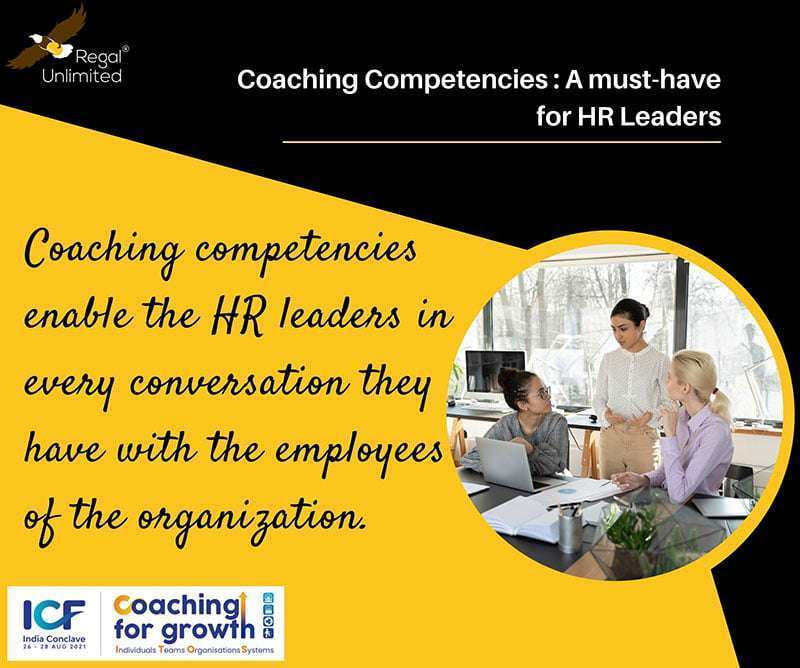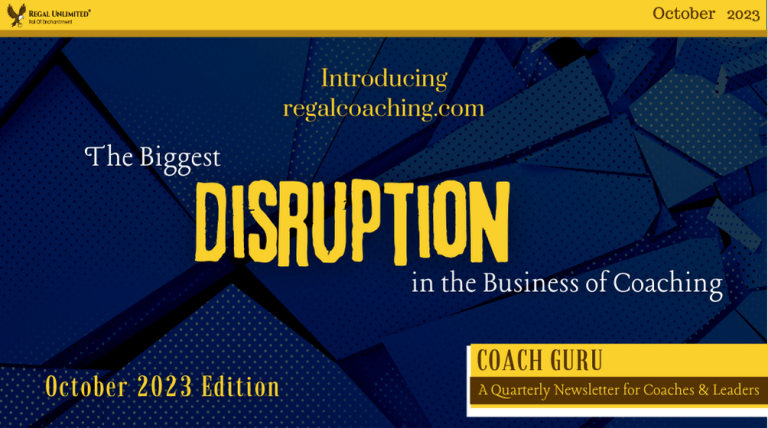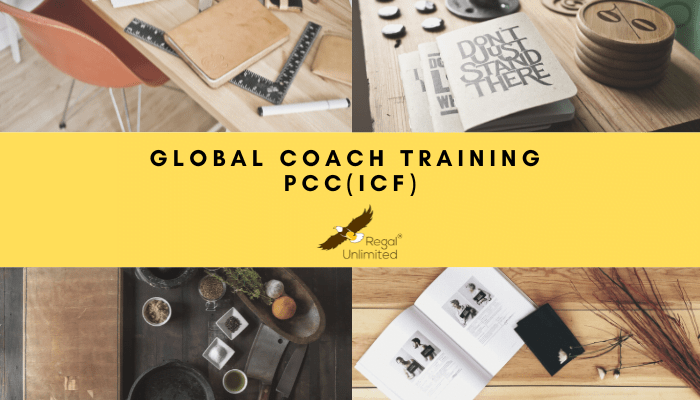“Coaching competencies complete an HR Leader.” – Regal Unlimited
The time has arrived for the HR leaders to focus on coaching initiatives in their organizations. Considering the turbulent changes, traditional developmental interventions are becoming less productive and successful. Executive coaching provides innovative opportunities to enable HR initiatives to be in sync with business vision. Demonstrating mindful presence while engaging a diverse workforce with driving changes makes it incumbent upon HR professionals to develop coaching competencies themselves.
Courtesy of the ICF Coaching Conclave 2021, India, we got to hear path-breaking ideas from the industry leaders and professional coaches through power talks and panel discussions. One such discussion impaneled veterans and coaches in the field of human resources. As an aspiring HR professional, on a personal note, I was looking forward to hearing from such an illustrious panel.
Dr. Arvind N Agarwal, Partner, Global HR Lead Partners, holds a Ph.D. from IIT Bombay, PGDBA from IIM Ahmedabad, and BSc from IIT Kharagpur. During his illustrious career spanning over four decades across Xerox, Escorts, JCB, and RPG enterprises, Dr. Agarwal has served in Human resources as well as business roles including CEO for 5 years. Dr. Agarwal, MCC from ICF is an Executive coach in leadership & Organisation Development Consultant, based in Mumbai.
Miss Carrie Abner is an Association management executive and has over two decades of experience at the International Coaching Federation, Council of State Governments, and International Council for Voluntary Action. As the Vice President of ICF Credentials and Standards, she works on the certification of coach practitioners and ensures a higher standard for professional coaching practice.
RR Nair is a CXO Coach, OD Consultant, and Advisor/Independent Director. Associated with ISB on Leadership programs, a Past President, NHRDN Banglore, CFI fellow, has won National and Lifetime Achievement Awards from NHRD and CNBC-KPMG.
Dr. Arvind initiated his talk by expressing his concern over the active role of HR during times of pandemics all around the globe. Many of the CHROs have worked tremendously in arranging hospital beds, oxygen concentrates, and now they are trying hard to get all of their employees vaccinated. To sustain the continuity of business, HR leaders have continued to fulfill those traditional responsibilities, despite the best of their intentions, they had to see people laid off jobs, cut down the salaries, and strive to meet the ends of the organization. Yet they had to care for people.
In order to recollect my learnings and reflections, allow me to pen down the panel discussion in the Q&A format, as I recollect to the best of my capability:)
Why coaching and how can it lead to the success of an organization?
ICF defines Coaching as partnering with clients in a thought-provoking, creative process that inspires and maximizes their personal and professional potential. To be a Coach Practitioner, ICF means a person who has completed a minimum of 60 hours of coach-specific training and has been in this role on an ongoing basis.
A manager who uses coaching skills works with subordinates to create awareness and support behavior change. Miss Carrie feels it is possible to use coaching knowledge, approaches, and skills.
What does coaching offer to organizations and HR leaders?
According to research by the Human Capital Institute, 77% of human resource practitioners reported that their organizations are in a state of constant change. In search of a complex landscape of the workplace,
Organizations need to implement unique strategies to be able to thrive and succeed.
Organizations need to engage their employees. Employees need to feel that their ideas and contributions are valued and they are part of the organization.
While organizations have a clear vision, they must have an adaptive environment to create capacity for agility and shift in order to respond to changes in the marketplace is more important.
Organizations must also promote a culture of Learning and Development at all levels for individual as well as collective success.
Organizations need to build trust. For employees to give the best at their work, there has to be trusted among the members of the team as well as in the organization. Transparency, clear communications, relationship building, listening, and respecting are key elements of building trust.
Organizations must create space for experimenting to foster innovation. Therefore, a work environment that is safe for employees to try new ideas, to fail, and to learn from the trails for future refinements has to be created.
Coaching supports each of these elements and builds a learning environment in the organization.
What is the role of an HR leader in establishing the coaching culture?
- Integrating coaching skills into human resources. A well-known fact is that HR leaders have varied roles, coaching supports the HR leaders in the conversations they have with the employees and supports them on their growing and development prospects in the organization. Also to provide an inclusive environment for sharing new ideas.
- Promoting coaching culture in an organization. Implementation of a successful coaching culture includes 3 modalities of coaching: (a) Internal leaders who provide coaching. (b) External coaches provide coaching within an organization. (c) Leaders who get trained and certified in coaching competencies (preferably ICF) and then integrate coaching skills into the daily routine.
- Staying informed about the use of resources of coaching in the organization. ICF is a great partner, helping to recognize the importance of ICF credential coaches who have demonstrated higher standards in professional and ethical practice. Accredited ICF’s coach-specific training programs support and sustain the organization’s culture of coaching within the organization.
The panelist also made a mention of Dr. Daniel Goldman who undertook a study whose findings are reported in Harvard Business Review, the year 2000.
- Leaders ranked coaching as their least preferred style. But now the world has many reputed coaching institutions which means that the leaders are ready to ask, listen and learn.
- CEOs are yet to be equated with the CFOs with the CHROs. CFOs seem to come across as fact-based and as a stronger point of view on financial capital. Coaching competencies to help CHROs to become even more confident to establish the point of view courageously on issues relating to organizations. Quoting the study he surmised that CFOs have a feeling that CHROs are preoccupied with transactional stuff and therefore must invest more time on the transformational agenda. Coaching becomes more relevant in the transformational arena.
- The HR function is dramatically transforming. In such times there is a need to avoid the temptations of taking up many initiatives. Rather, focus on the vital few and concentrate upon their execution.
- Emerging topics like nature of work, the feature of work, the feature of business models are inherently dynamic topics in which HR professionals with research orientation must do an in-depth study with their competencies.
- As accredited professionals, they must renew their capabilities and support each other with peer coaching.
- There is a guaranteed invitation for CHROs and senior HR professionals as they assume a greater, impactful role to fundamentally alter the culture of an organization.
What are the top coaching competencies that are fundamental to HR leaders?
For the uninitiated, ICF as a Coaching body has collated a list of Coaching competencies (well researched and validated), that we ought to master and demonstrate in the CKA and REcording submissions to get ICF Credential.
Answering the question, Miss Carrie Opined Demonstrating ethical practices is a must for HR professionals and they need to be clear with the limits of confidentiality and expectations from the organization. Additionally, the cultivation of trust and safety is a key factor for success.
Research shows that companies with high levels of trust outperform those with lower levels of trust by 186%. Active listening is another competency ensuring that both the parties to a conversation are comprehending each other.
What are the coaching pitfalls that HR leaders must look out for?
The answer to this question resonated with me the most, because as an aspiring HR coaches, we all want to be forewarned and refrain from erring. Mr. Nair in his inimitable style coupled with his immense experience in the industry gave the perfect reply according to me.
As an HR professional and coach, Mr. Nair listed down a few pointers; lack of distinction between what Coaching is and what coaching isn’t, not being clear on the need to maintain confidentiality, focusing only on organizational agenda, unrealistic expectations of coaching outcomes, not knowing the basics of the art and science of coaching process and not continuously upgrading yourself as a Coach (through ICF Renewals, etc.)
Each of these points, I believe, are relevant for HR coaches to be wary about.
As an HR professional what has to be done to implement the coaching culture in an organization?
Mr. Nair recalls the lesson learned from P L Tandon, Chairman, Unilever India, “It is important to grow local talent and local management”. In Unilever, meritocracy helps in creating the learning environment. The management trainees who are coached, assess the significant leaders of the company. Coaching must be a part of the leadership, organisations must constantly equip people with coaching skills to become effective leaders. He feels that
Coaching can not be imitated. It has to be unique, customized for the organizational ethos.
The answer brought back reflections from my earlier organizational experience where the Coaches were trying to coach the field and create a unique culture instead of just repeating and imitating the successful case studies of Coaching. They gave critical importance to the value External Coaches (professional and certified) add in creating a distinct culture in collaboration with the internal team leaders.
How to integrate coaching competencies into the education system?
Unfortunately, coaching as a development intervention is not impactful even in specialized HR schools. Therefore, there is a need for the adoption of coaching and development in a broader and deeper perspective as part of the curriculum for HR professionals.
How to leverage on coaching in a startup ecosystem where people choose mentoring over coaching?
The level of intensity and time horizon to accomplish is compressed in start-ups. Therefore, a mentor is preferred because he has an experiential background that enables and empowers the team. Since coaching takes a significant amount of time, mentors play multiple roles of being an advisor, transferring their wisdom in particular fields. Hence, mentors are preferred above coaches.






